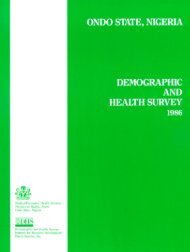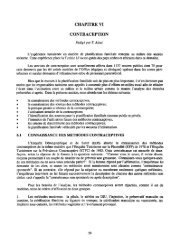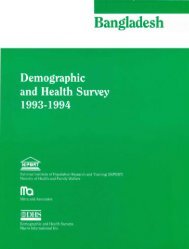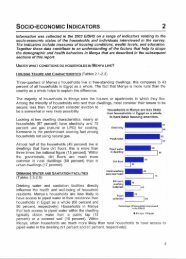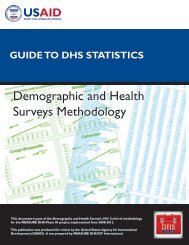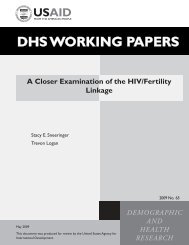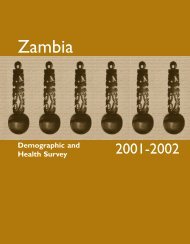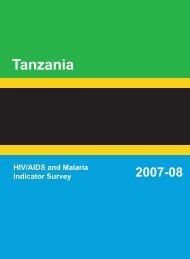Vietnam Population and AIDS Indicator Survey 2005 ... - Measure DHS
Vietnam Population and AIDS Indicator Survey 2005 ... - Measure DHS
Vietnam Population and AIDS Indicator Survey 2005 ... - Measure DHS
You also want an ePaper? Increase the reach of your titles
YUMPU automatically turns print PDFs into web optimized ePapers that Google loves.
4.5 KNOWLEDGE OF MOTHER-TO-CHILD TRANSMISSION<br />
An HIV positive mother can potentially transmit HIV to her child during pregnancy, labor <strong>and</strong><br />
delivery, or while breastfeeding. Risk of mother to child transmission can be reduced through the use of<br />
anti-retroviral therapy. Therefore, increasing the level of knowledge of transmission of the virus from<br />
mother to child is critical to improving the health of HIV-infected mothers <strong>and</strong> reducing the risk of<br />
transmission to their children.<br />
All women <strong>and</strong> men interviewed in the VPAIS were asked if the virus that causes <strong>AIDS</strong> can be<br />
transmitted from a mother to a child during pregnancy, during delivery, or during breastfeeding. Those<br />
who reported they were aware of the risk of mother to child transmission were further asked if there are<br />
any special medications that a doctor or nurse can give to a pregnant woman who is infected with the<br />
<strong>AIDS</strong> virus to reduce the risk of transmission to the baby. Theoretically, knowledge that mother to child<br />
transmission can be prevented will alter the woman’s care-seeking <strong>and</strong> breastfeeding behavior.<br />
Knowledge of mother to child transmission varies greatly by transmission mode. Knowledge of<br />
transmission during pregnancy <strong>and</strong> delivery is high among both women <strong>and</strong> men, while knowledge of<br />
transmission through breastfeeding is less commonly known. Three-quarters of all respondents know that<br />
HIV can be transmitted during delivery <strong>and</strong> 90 percent of respondents know that HIV can be transmitted<br />
during pregnancy. While only 2 in 10 women <strong>and</strong> men know about anti-retroviral drugs to reduce the risk<br />
of mother to child transmission, 21 percent of women <strong>and</strong> 18 percent of men know that there are special<br />
drugs that a doctor or nurse can give to a pregnant woman infected with the <strong>AIDS</strong> virus to reduce the risk<br />
of transmitting the virus to the baby. About four in ten women <strong>and</strong> men of reproductive age know that<br />
HIV can be transmitted from a mother to her child by breastfeeding (43 percent of women <strong>and</strong> 39 percent<br />
of men as shown in Table 4.4). Thus, the combined indicator shows that only about 15 percent of women<br />
<strong>and</strong> men of reproductive age know both that HIV can be transmitted through breastfeeding <strong>and</strong> that the<br />
risk of mother to child HIV transmission during pregnancy can be reduced with medication.<br />
Women <strong>and</strong> men are about equally knowledgeable with regard to the risk of HIV transmission<br />
through breastfeeding <strong>and</strong> the existence of ARVs for reducing mother to child transmission. Those least<br />
likely to be aware of these aspects of transmission are women <strong>and</strong> men who have never attended school;<br />
they are less than half as likely as people with some formal schooling to know of breastfeeding<br />
transmission <strong>and</strong> ARVs.<br />
HIV/<strong>AIDS</strong>-Related Knowledge | 41



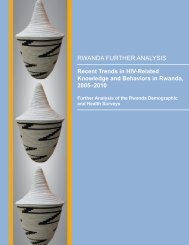

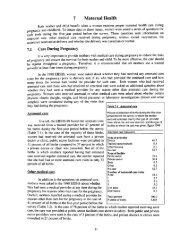


![Obtaining Informed Consent for HIV Testing [QRS4] - Measure DHS](https://img.yumpu.com/49850117/1/190x245/obtaining-informed-consent-for-hiv-testing-qrs4-measure-dhs.jpg?quality=85)
